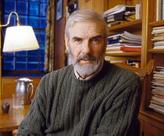Jonathan Spence
Sterling Professor of History
 Jonathan Spence, B.A. Cambridge University, M.A. Ph.D. Yale University, faculty member at Yale since 1965, you are recognized as one of the foremost scholars of Chinese civilization from the 16th century to the present. You came to Yale in the late fifties as a Clare-Mellon fellow—and by doing so became the most valuable British import prior to the Beatles! How lucky we are that while you were here you met your distinguished mentor Mary Wright, and with her guidance and support you chose Chinese history as your subject. In book after book over 40 years—an apostolic 12, if the count is correct—you have described the role of history itself in shaping modern China, sweeping your readers along through the vast and dense swathes of Chinese history with a novelist’s drive and a poet’s attention to detail and language. Your critically acclaimed The Search for Modern China has become one of the standard texts on China. And through book after book you have not lost your touch: Your most recent book, Return to Dragon Mountain: Memories of a Late Ming Man is a mesmerizing biography of a Ming man, told with a storyteller’s flair, has been the subject of the highest praise and unanimously flattering reviews.
Jonathan Spence, B.A. Cambridge University, M.A. Ph.D. Yale University, faculty member at Yale since 1965, you are recognized as one of the foremost scholars of Chinese civilization from the 16th century to the present. You came to Yale in the late fifties as a Clare-Mellon fellow—and by doing so became the most valuable British import prior to the Beatles! How lucky we are that while you were here you met your distinguished mentor Mary Wright, and with her guidance and support you chose Chinese history as your subject. In book after book over 40 years—an apostolic 12, if the count is correct—you have described the role of history itself in shaping modern China, sweeping your readers along through the vast and dense swathes of Chinese history with a novelist’s drive and a poet’s attention to detail and language. Your critically acclaimed The Search for Modern China has become one of the standard texts on China. And through book after book you have not lost your touch: Your most recent book, Return to Dragon Mountain: Memories of a Late Ming Man is a mesmerizing biography of a Ming man, told with a storyteller’s flair, has been the subject of the highest praise and unanimously flattering reviews.
What you have done in print you have done no less for generations of Yale students, galvanizing large lecture classes in Chinese history decades before ‘China was China’—that is, before western interest in China had reached the heights of the past few years. So popular was your lecture course that students had to be admitted in cohorts: senior majors in Chinese, Japanese, History, and East Asian Studies on Day One; Junior majors in the same on Day Two; and everyone else, as far as the room would hold, on Day Three. One of your students describes your grip on the classes best: “No event worth mentioning was too large to be refracted through a single human life and no life was too minor to have its humanity summoned up from the past alongside the abstraction of its historical significance. Spence could manage this level of detail even in a 50 minute lecture because of his knack for drawing a profile out of a single image—the Kangxi Emperor advising a bondservant on his health, Ding Ling’s mother running around an athletic field on her newly unbound feet, a Boxer victim’s Steinway piano, Mao aboard his private train. He could ‘catch the essence,’ as he sometimes describes it, of people and of historical moments so they lit up like lightning bugs in a jar.”
Your manifold honors include the William C. DeVane Medal of the Yale Chapter of Phi Beta Kappa in 1978; the Los Angeles Times History Prize in 1982; and the Vursel Prize of the American Academy and Institute of Arts and Letters in 1983. You were named a fellow of the American Academy of Arts and Sciences in 1985, a MacArthur Fellow in 1988, and that same year you were appointed to the Council of Scholars at the Library of Congress. In June 2001, you were made a Companion of the Distinguished Order of St. Michael and St. George, an honor given by the Queen of England for outstanding achievement. And as a capstone to your career, you were named president of the American Historical Association for the 2004-2005 term.
For all of this, Jonathan Spence, you have always been a devoted Yalie, deeply involved in the life of this small community. Your office is in TD, of which you are a faithful fellow. For years, you have attended these Yale College faculty meetings, an astute and interested observer of university politics and university people. If we have one consolation as you retire it is that you are not likely to go too far for too long: an avid gardener, we hope your magnificent garden in West Haven always will call you home from your travels. And when they do, Yalies always will be there to welcome you, with gratitude, respect and affection. Xie Xie Xie Xie!
Tribute Editor: Penelope Laurans